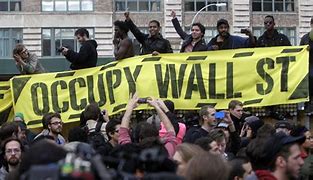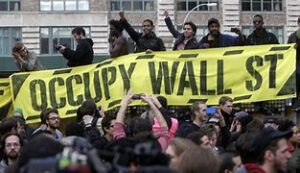Occupy [Insert Name Here]

 At first glance, the Occupy Movement which has invaded many US cities, infuriating local politicians, perplexing the press and bewildering many passersby, seems to have come out of nowhere and to have no direction. More than one article has asked, What do the Occupiers want? NPR has featured guests on All Things Considered who have been available to speak on behalf of the Movement, but who have themselves acknowledged that they don’t have a leader and are still seeking to clarify their message.
At first glance, the Occupy Movement which has invaded many US cities, infuriating local politicians, perplexing the press and bewildering many passersby, seems to have come out of nowhere and to have no direction. More than one article has asked, What do the Occupiers want? NPR has featured guests on All Things Considered who have been available to speak on behalf of the Movement, but who have themselves acknowledged that they don’t have a leader and are still seeking to clarify their message.
But, if you stop to think about it for a few minutes (or just read this blog post) it will occur to you that the Occupy Movement has been a long time in coming, makes perfect sense, and we’d better pay attention.
Over the last several months we’ve witnessed populist uprisings in country’s far removed from our own. Tunisia, Lebanon, Algeria, Jordan, Sudan, Lebanon, Iraq, Syria, and, of course, Egypt, and Libya, among many others have each experienced marching in the streets, violence and/or complete seizures of the government. More than 30,000 people have died for these causes – seeking freedom, opportunity, and equality.
What makes us think that the US should be any different? Perhaps we live in the greatest country in the world (for now), but there are some important areas where others have us beat.
Back in the 1980’s, the decade of greed (i.e. the movie Wall Street’s Gordon Gekko: “Greed is good!”), 1% of Americans controlled about 12% of the country’s income and 33% of its wealth. Now we know that this top 1% was just getting warmed up. Today these titans control nearly 25% of America’s income and 40% of wealth. Over the last decade, inclusive of the deep recession that we’ve been battling since 2008, the top 1% of income earners in America have seen their incomes increase by 18%, while those in the middle class have seen their incomes decline in real terms.
While countries in Latin America which have historically been bastions of income inequality, such as brazil, have battled to “improve the plight of the poor and reduce gaps in income, America has allowed inequality to grow.” This puts us on par with Russia and Iran for national income inequality. Imagine that!
But we’re not done. Nobel Prize winning economist, Joseph Stiglitz, predicts that this trend will continue – “the underdogs will continue losing ground to the overdogs.” Stiglitz further points out that we might see “our growing inequality as a quintessentially American achievement – we started way behind the pack, but now we’re doing inequality on a world-class level.”
Obviously, not a compliment, but it does matter… especially for those of us who are, or who aspire to be, among that top 1%. Consider that an economy in which most citizens are doing worse year after year after year is not likely to do well over the long term. “Growing inequality is the flip side of… shrinking opportunity,” which means, by definition, that many Americans, our most valuable asset, are not able to be productive or contribute meaningfully to society.
When wealth is concentrated among such a small group, so is power; and that power is used to keep wealth concentrated. As a result, investment in education, technology and infrastructure dries up. Sound familiar?
Despite the benefits that we now enjoy from investments in public health (biotechnology), technology (Internet) and infrastructure (interstate highways); congress (most of whom are among the 1% and financed by the 1%) can’t get their act together to pass legislation that will continue to make such investments. This despite the fact that we are clearly falling behind emerging world economies in education, our bridges are crumbling and these investments will also have the effect of helping to spur economic growth, raise tax revenue and reduce unemployment rates.
None of this should come as a surprise. “The rich don’t need to rely on government for parks, education, medical care or personal security – they can buy these things for themselves.” Does this seem short-sighted?
When wealth is so concentrated, laws intended to create a level playing field will undoubtedly be changed to make it tilt; and before you know it a sense of common national purpose erodes. Ultimately, it’s that sense of common purpose that creates the United States of America.
Occupiers are concerned that that sense of common purpose has already eroded too much. (1) On the one hand, brilliant financial engineers, at the top of the 1% heap, brought us to the brink of national financial collapse. So we bailed the banks and the automotive industry out. (2) Now the government tells us that we have emerged from recession, corporate profits have risen to record levels, the Dow is above 12,000 and Bank of America, one of the banks that taxpayers bailed out, sought to impose a monthly debit card fee to allow you the use of your money. (3) Yet, on the other hand, property values, in some communities, are lower than they were 20 years ago, banks are slow to lend (and when they do it’s not against fixed assets – an incredible statement), job growth barely beats population growth leaving unemployment at 9%, and unemployment among recent college graduates and ethnic minorities is more than twice that.
So then, with all of this as backdrop, the Occupy Movement begins to come into focus. These people are concerned for themselves and concerned about the future of our country.
But the 1% thinks that they don’t need to care. They couldn’t be more wrong.
America prides itself on being the land of opportunity, where everyone has an equal chance of getting ahead. However, with a widening income gap, the chance of a lower- or middle-class American making it to the top is now worse than many countries in Europe. Persistent youth unemployment in the Middle-East has served as kindling for citizen unrest and a similar pattern here at home seems to be birthing the same. In Yemen and Bahrain ruling families look down from their air-conditioned penthouses to wonder if their fate will be much different than the former rulers of Egypt and Libya. How different is that from the way our CEO’s look down from their glass office towers?
Alexis de Tocqueville once described the genius of American society as “self-interest properly understood” or enlightened self-interest. This is an important notion, as rather than the more narrow definition of self-interest: what’s good for me right now; de Tocqueville references the ideal that the common good is critical to my own ultimate well-being. Rather than the concept of a liberal do-gooder, he views this as the highest order of “going for yours.” In other words, the fate of the 1% is inextricably tied to the fate of the 99%.
Witness the 1960’s: a tilted playing field will most certainly lead to revolution. The revolution may have already begun – and it is being televised, posted on YouTube, shared on Facebook and tweeted on Twitter.
History has not been kind to communities and nations which hasten to serve the needs of the strong at the expense of the weak. Wake up America! We’d better pay attention to the disorganized efforts of Occupy [Insert Name Here]. We ignore them at our peril.
This piece draws liberally from articles written by Graydon Carter, editor, and Joseph Stiglitz, Nobel Prize winner, in the May 2011 issue of Vanity Fair.
